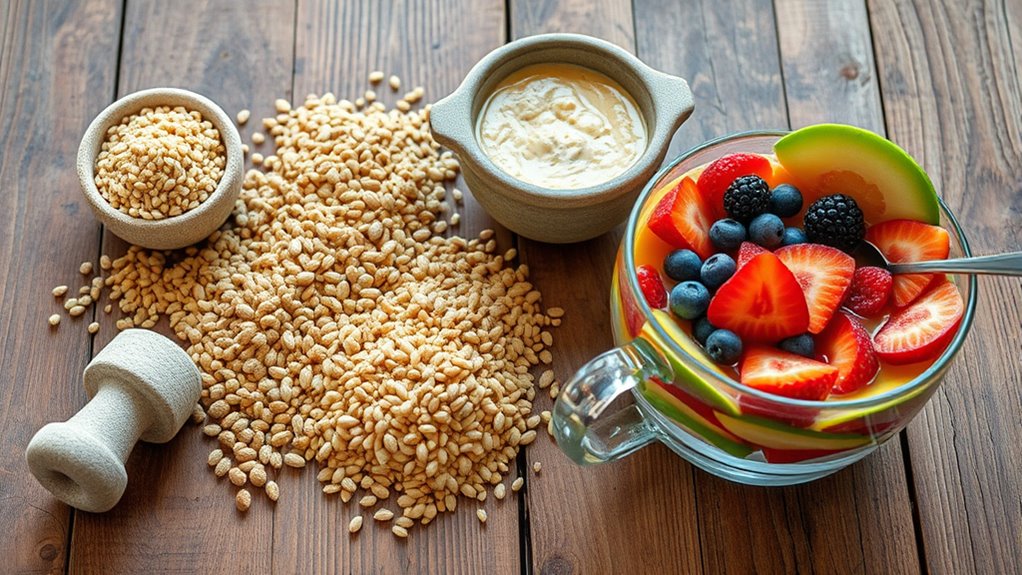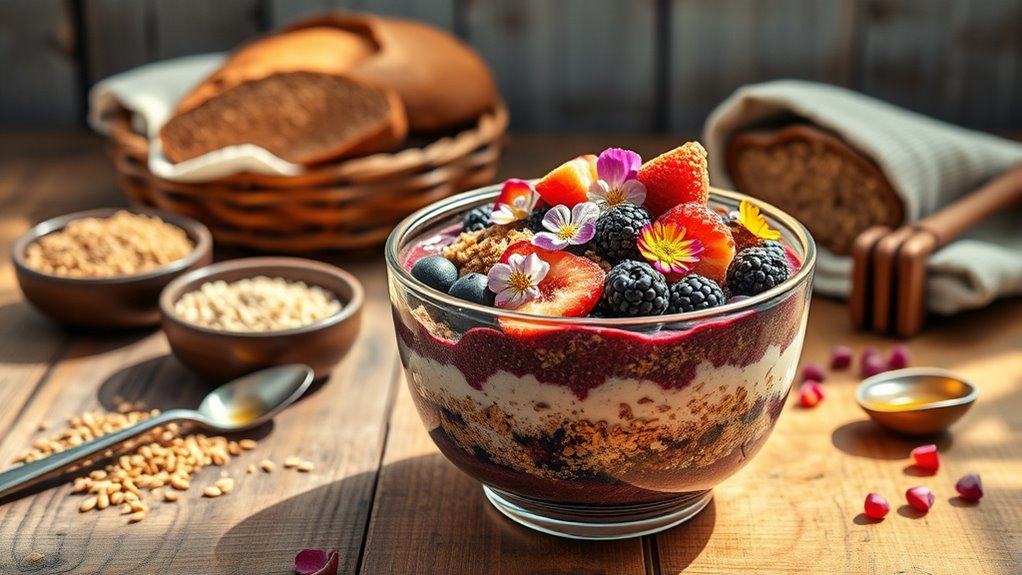The evolution of breakfast shifts from simple, hearty grains like barley and wheat around fires in ancient times to the diverse, health-oriented bowls you enjoy today. Over centuries, people added fruits, nuts, dairy, and luxury items, reflecting social changes and innovation. The Industrial Revolution sped up the process with packaged cereals, while modern trends celebrate global flavors and presentation. If you keep exploring, you’ll discover how these changes shaped your everyday morning meal.
Key Takeaways
- Early breakfasts focused on simple, hearty grains like barley and millet, shared around communal fires.
- Greco-Roman times introduced fruits, nuts, dairy, and honey, diversifying morning meals.
- Medieval elites ate structured breakfasts with bread, eggs, and meats, while common folk had quick, practical options.
- The Industrial Revolution popularized processed cereals and quick, convenient breakfast foods.
- Modern trends emphasize health, presentation, and global flavors, with options like smoothies and artisanal bowls.

Have you ever wondered how breakfast has transformed over the centuries? It’s fascinating to see how what you eat first thing in the morning has evolved from simple, everyday staples to the diverse, vibrant meals we enjoy today. Long ago, breakfast was primarily about sustenance and practicality. Ancient civilizations relied heavily on grains like barley, millet, and wheat, preparing them as porridge or flatbreads. These early meals were hearty, filling, and easy to make with limited resources.
In many cultures, breakfast wasn’t a separate, elaborate affair but rather a straightforward start to the day, often shared with family around a fire or a communal table.
As societies advanced, so did their breakfast options. The Greeks and Romans introduced more variety, incorporating fruits, nuts, and dairy into their morning routines. They began to see breakfast as not only fuel but also a chance to indulge a little, adding honey or cheese to their grains.
During the Middle Ages, breakfast became more structured in some regions, especially among the wealthy, who enjoyed bread, eggs, and meats. However, for most, it remained a simple, quick meal, often eaten out of necessity rather than enjoyment.
The industrial revolution marked a turning point, bringing about mass production and convenience. Cereal grains, especially oats and wheat, became processed into more accessible forms like flakes and packaged cereals.
Suddenly, breakfast shifted from a homemade, slow-prepared meal to a quick, grab-and-go affair. The invention of cereal boxes and breakfast cereals in the late 19th and early 20th centuries transformed mornings into a commercialized experience, emphasizing speed and convenience.
People began to see breakfast as a routine that could be both efficient and nutritious, often with a bowl of cereal, milk, and maybe a piece of toast.
In recent decades, the concept of breakfast has expanded even further. Today, you can choose from an endless array of options, from smoothies and yogurt bowls to avocado toast and plant-based alternatives.
The emphasis is increasingly on health, variety, and personal preferences. Breakfast now reflects a globalized culture, blending flavors and ingredients from around the world.
You have the freedom to craft a meal that suits your lifestyle, whether it’s a quick protein shake before work or a leisurely weekend brunch with friends.
The journey from ancient grains to modern bowls illustrates how breakfast continuously adapts to societal changes, technological advances, and evolving tastes. It’s no longer just about filling your stomach; it’s about enjoying a moment of nourishment and pleasure at the start of your day.
Additionally, the rise of handmade ceramics and artisanal serveware has elevated breakfast presentation, turning meals into a visual and sensory experience.
Frequently Asked Questions
How Did Breakfast Habits Differ Across Ancient Civilizations?
You might notice that breakfast habits varied widely among ancient civilizations. In Egypt, you’d likely eat bread and beer, while Greeks preferred olives, cheese, and honey.
Romans often started with bread, fruit, and wine. Meanwhile, in China, rice porridge was common, and in Mesoamerica, maize-based dishes like tortillas and stews were typical.
These diverse diets reflect each culture’s environment, resources, and traditions shaping their morning routines.
What Role Did Trade Play in Evolving Breakfast Ingredients?
Did you know that trade routes like the Silk Road helped introduce new breakfast ingredients across continents? You play a part in this story, as trade expanded access to items like spices, sugars, and exotic grains, transforming breakfast tables worldwide.
These exchanges allowed civilizations to experiment with flavors and ingredients, making breakfast more diverse and delicious over time. Your breakfast today is a result of centuries of global trade and cultural sharing.
When Did Breakfast Become a Daily Social Ritual?
You might notice that breakfast became a daily social ritual during the Middle Ages, especially among Europeans. People started gathering in communal spaces like taverns or homes, sharing food and conversation before work or church.
This tradition grew over centuries, with social norms encouraging morning gatherings. Today, you’re part of that long history, enjoying breakfast not just for nourishment but also for connection and community.
How Have Modern Dietary Trends Influenced Breakfast Choices?
Modern dietary trends have markedly shaped your breakfast choices. You’re now more likely to choose plant-based options, gluten-free foods, or high-protein meals to support health goals.
Convenience also plays a role, leading to grab-and-go options like smoothies or protein bars.
Additionally, awareness of sustainability influences your decisions, encouraging organic or locally sourced ingredients.
These trends reflect a broader focus on health, wellness, and environmental responsibility in your daily breakfast routine.
What Are Emerging Breakfast Innovations in the 21ST Century?
You’ll notice that 21st-century breakfast innovations focus on health, convenience, and sustainability. You might start your day with plant-based options like vegan yogurts or protein-packed smoothies.
Innovative lab-grown meats and insect-based proteins are gaining popularity for their eco-friendly benefits. Additionally, functional foods infused with probiotics, adaptogens, or superfoods help boost energy and immunity.
These trends make breakfast more personalized, nutritious, and aligned with your values of wellness and environmental responsibility.
Conclusion
As you’ve seen, breakfast has come a long way, from ancient grains to vibrant modern bowls. Each era adds its own flavor and innovation, shaping how you start your day. Remember, the early bird catches the worm, so choosing nourishing options keeps you ready for whatever lies ahead. Embrace the evolution and make your morning meal a reflection of tradition and creativity—because a good breakfast sets the tone for everything to come.









